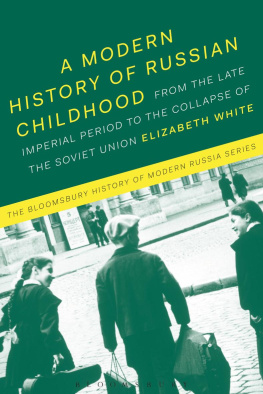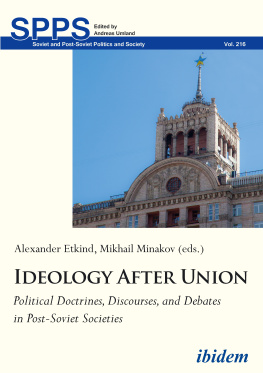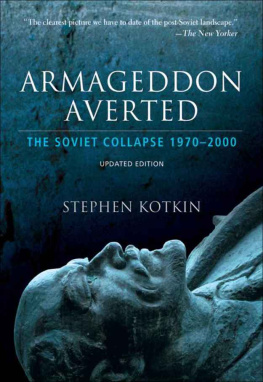WARPED MOURNING
Stories of the Undead in the Land of the Unburied
Alexander Etkind
STANFORD UNIVERSITY PRESS
STANFORD, CALIFORNIA
Cultural Memory in the Present
Mieke Bal and Hent de Vries, Editors
Stanford University Press
Stanford, California
2013 by the Board of Trustees of the Leland Stanford Junior University.
All rights reserved.
No part of this book may be reproduced or transmitted in any form or by any means, electronic or mechanical, including photocopying and recording, or in any information storage or retrieval system without the prior written permission of Stanford University Press.
Printed in the United States of America on acid-free, archival-quality paper
Library of Congress Cataloging-in-Publication Data
Etkind, Aleksandr, 1955author.
Warped mourning : stories of the undead in the land of the unburied / Alexander Etkind.
pages cm. (Cultural memory in the present)
Includes bibliographical references and index.
ISBN 978-0-8047-7392-8 (cloth : alk. paper)
ISBN 978-0-8047-7393-5 (pbk. : alk. paper)
ISBN 978-0-8047-8553-2 (e-book)
1. Russian literature20th centuryHistory and criticism. 2. Grief in literature. 3. Socialism and literatureSoviet Union. 4. Collective memory and literatureSoviet Union. 5. Collective memory and literatureRussia (Federation) 6. Victims of statesponsored terrorismSoviet Union. I. Title. II. Series: Cultural memory in the present.
PG3020.5.G75E75 2013
891.709'35847084dc23
2012028868
ISBN 978-08047-8553-2 (electronic)
Contents
Illustrations
.
.
.
.
.
.
.
.
.
.
.
.
.
Transliteration Note
In the main body of the text, the transliteration of Russian names has been simplified with a view to making them easier on the Anglophone readers eyes (hence, for example, Yury Brodsky rather than Iurii Brodskii). Likewise, where established conventional English spellings of particular names and place names exist, these have been given preference (hence, for example, Mandelstam, not Mandelshtam). In the footnotes and bibliography, Russian names and sources have been transliterated according to the Library of Congress system. The acronym for Gosudarstvennoe upravlenie lagerei (State Administration of Camps) should be rendered as GULag, but I have opted to spell this word gulag and understand it in a broader meaning. All translations are mine unless stated otherwise.
Acknowledgments
This book is rooted in the history of my family, the Etkinds, and in my background, as part of the ex-Soviet intelligentsia. Decades ago, my father, the art historian Mark Etkind, told me that he wanted to write a book about the artists who perished during Stalins terror. He died soon afterward and did not have the chance to write it, but he could have written some of the pages that appear in my book. My uncle, Yefim Etkind, inspired many of my speculations, and I refer to his brilliant writingshis memoirs as well as his scholarshipoften, though not often enough. This book is my work of mourning for both of them, and also for my stepfather, Moisei Kagan, a prominent philosopher who fought in World War II, survived ideological purges, wrote excellent books, and lived long enough to lose faith in the Soviet regime, though not in Marxism. Apart from my family, I knew only a few of the figures about whom I have written in the following chapters. Once, however, in 1986, Dmitry Likhachev helped me win what seemed a hopeless conflict; more recently, his writingsmemoirs and scholarshiphave helped me to make sense of my own conflicting ideas. I also know Lev Klein, another camp survivor and brilliant scholar; it so happened that many years ago he published my first article. I have no reason to think that these persons would agree with me if they read these pages: the work of mourning is as rebellious as it is mimetic. But I cherish my belief that they would, and actually did, support the effort.
A long time ago my conversations with the leaders of the Memorial Society in St. Petersburg, Veniamin Iofe and Irina Flige, helped me to elaborate the general framework of this book. Later, this project benefited from several awards that were equally important. In 1999, I was a fellow at Wissenschaftskolleg in Berlin, where I chatted over lunches with Aleida Assmann, the leading expert in German memory, and Stephen Greenblatt, the leading Shakespeare scholar. Their impact on my thinking is much appreciated. In 2001, I received a grant from the Open Archives of the Central European University. I am grateful to Istvan Rev, the director of the archives, not least because I also used this grant to take my wife, Elizabeth Roosevelt Moore, on a honeymoon doing research at several sites of the former gulag in the Russian North. We later continued with a tour through the former plantations of the American South. Many of my current ideas were conceived in my conversations with Elizabeth, as we both tried to explain and understand our legacies. In 2006, I received a fellowship from the Davis Center for Historical Studies at Princeton University, and I want to send my thanks to Gyan Prakash, Michael F. Laffan, Anson Rabinbach, and Stephen Kotkin for the many fruitful exchanges and events that followed. Readers of my book will note the influence of my cofellow at the Davis Center, Ronald Schechter.
In 2010, I received a large grant from HERA (Humanities in the European Research Area) for the collective study Memory at War: Cultural Dynamics in Poland, Russia, and Ukraine. With the support of the Department of Slavonic Studies at the University of Cambridge, we have created a unique research environment for studies of memory and mourning across eastern Europe. My colleagues at Cambridge, Simon Franklin, Emma Widdis, and Rory Finnin, helped me to shape the Memory at War project, and this is another opportunity to thank them. The participants of Memory at War have given me invaluable inspiration and feedback, and I want to thank, among others, Julie Fedor, Uilleam Blacker, Ellen Rutten, Sander Brouwer, Galina Nikiporets-Takigawa, and Jill Gather. Among the many interactions in the larger European framework connected to this project, those with Jay Winter, Andrzej Nowak, and Andriy Portnov were particularly helpful.
I received valuable feedback after my talks at the Research Seminar of the Slavic Department of Princeton University (2008); the conference Finding a Place in the Soviet Empire at the University of Illinois at Urbana-Champaign (2011); the conference Memory and Theory in Eastern Europe at Kings College, Cambridge (2011); and the joint seminar Memory and Literature after Auschwitz and the Gulag, which Dominick LaCapra and I gave at the University of Colorado at Boulder in 2011. A series of Interdisciplinary Mellon Seminars in East European Memory Studies, which Harald Wydra and I gave to a fantastic group of graduate students and colleagues at CRASSH (the Cambridge Center for Research in Arts, Social Sciences, and Humanities) in the spring of 2010, helped me to articulate some long-standing ideas.
This book has benefited greatly from discussion of its emerging parts with many friends and colleagues around the globe. Comments by Jana Howlett were important for . At the later stages of this project, Dmitry Bykov provided much-needed inspiration. Nancy Condee and Julia Vaingurt generously commented on the manuscript and helped to correct some of my mistakes.
Scholarship often entails disagreeing with friends, but it is equally important that friendship survives the arguments. Sometimes openly and sometimes implicitly, I argue in this book with Alexei Yurchak, Svetlana Boym, Yuri Slezkine, Mark Lipovetsky, Leonid Gozman, Eli Zarecky, Mischa Gabowitch, Natan Sznaider, Oleg Kharkhordin, Ilia Kalinin, Kevin Platt, Caroline Humphrey, Dirk Uffelmann, and Ilia Kukulin. Thanks to them all, and I hope that our arguments will continue.
Next page




